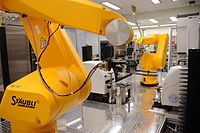
Identification and Analysis of Essential Genes in Streptococcus mutans with Transposon Sequencing.
Sign Up to like & getrecommendations! Published in 2022 at "Methods in molecular biology"
DOI: 10.1007/978-1-0716-1720-5_13
Abstract: Transposon sequencing (Tn-seq) has greatly accelerated the rate at which gene function can be profiled in microbial organisms. This technique has been applied to the study of the dental caries pathogen Streptococcus mutans where it… read more here.
Keywords: transposon sequencing; analysis; essential genes; identification ... See more keywords

Transposon sequencing analysis of Bradyrhizobium diazoefficiens 110spc4
Sign Up to like & getrecommendations! Published in 2021 at "Scientific Reports"
DOI: 10.1038/s41598-021-92534-z
Abstract: Bradyrhizobium diazoefficiens USDA110 is one of the most effective nitrogen-fixing symbionts of soybeans. Here we carried out a large-scale transposon insertion sequencing (Tn-seq) analysis of strain Bd110spc4, which is derived from USDA110, with the goal… read more here.
Keywords: transposon sequencing; transposon; sequencing analysis; bradyrhizobium diazoefficiens ... See more keywords

High-Throughput Mutant Screening in Vibrio cholerae via Transposon Sequencing.
Sign Up to like & getrecommendations! Published in 2023 at "Cold Spring Harbor protocols"
DOI: 10.1101/pdb.prot108185
Abstract: Transposon mutagenesis greatly facilitates the study of gene function in microorganisms ranging from viruses to fungi. Traditionally, one would study individual transposon mutants with interesting phenotypes one mutant at a time. Here, we describe methods… read more here.
Keywords: section outlines; transposon sequencing; vibrio cholerae; transposon ... See more keywords

High-Throughput Mutant Screening via Transposon Sequencing.
Sign Up to like & getrecommendations! Published in 2023 at "Cold Spring Harbor protocols"
DOI: 10.1101/pdb.top107867
Abstract: Transposon mutagenesis has been the method of choice for genetic screens and selections in bacteria by virtue of the transposon being linked to the disrupted gene, simplifying its identification. Transposon sequencing (Tn-seq) is a high-throughput… read more here.
Keywords: throughput mutant; high throughput; mutant screening; transposon sequencing ... See more keywords

High‐throughput transposon sequencing highlights the cell wall as an important barrier for osmotic stress in methicillin resistant Staphylococcus aureus and underlines a tailored response to different osmotic stressors
Sign Up to like & getrecommendations! Published in 2019 at "Molecular Microbiology"
DOI: 10.1111/mmi.14433
Abstract: Staphylococcus aureus is an opportunistic pathogen that can cause soft tissue infections but is also a frequent cause of foodborne illnesses. One contributing factor for this food association is its high salt tolerance allowing this… read more here.
Keywords: staphylococcus aureus; transposon sequencing; osmotic stress; stress ... See more keywords